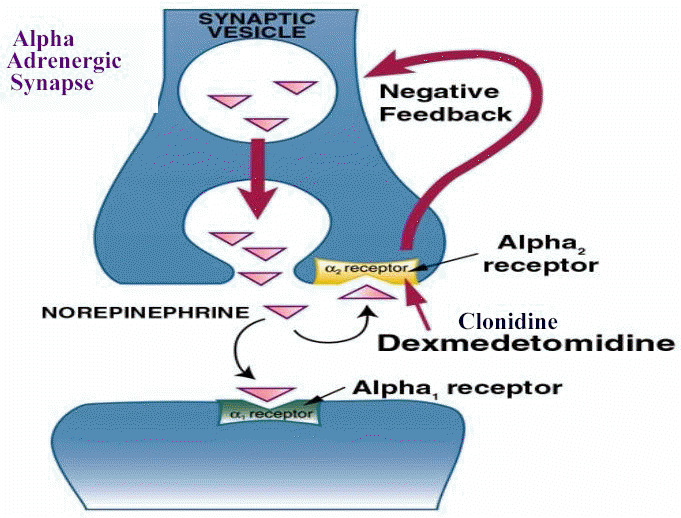-
α-2 receptors agonists:
-
Preoperatively, clonidine (Catapres) an α-2 adrenergic receptor agonist, causes sedation and reduces autonomic nervous system reflects responses.
-
These responses may include those secondary to catecholamine release in general and hypertension and tachycardia in particular.
-
-
Centrally-acting agents, such as clonidine (Catapres), reduce sympathetic autonomic outflow by acting mainly at α-2 presynaptic receptor sites. {note that α2 receptors have been found and extra-synaptic and postsynaptic sites as well}
-
Presynaptic stimulation decreases transmitter release.
-
Inhibition of norepinephrine release by presynaptic α2 receptor activation

-
Physiology of the α2-adrenoceptor agonists receptor.
-
Adapted from dexmedetomidine.com
-
-
-
Clonidine (Catapres): an appropriate oral dosage for preoperative medication should produce sedation and reduced autonomic nervous system reflects responses.
Preoperatively, appropriate oral clonidine may reduce preoperative myocardial ischemia in patients who likely have coronary vascular disease
Clonidine (Catapres) also may be used for patients not only with uncontrolled hypertension but also have the need for urgent surgery.
However, significant impairment of autonomic function, in particular attenuation of sympathetic responses, may mask hidden volume loss and delay compensation for the unrecognized hypovolemic state
5Dexmedetomidine (Precedex) is a more specific/potent alpha-2 receptor agonist compared clonidine (Catapres).
Dexmedetomidine (Precedex) exhibits both central and peripheral actions.
Anxiolytic, analgesic, sedative, and sympatholytic characteristics have been attributed to dexmedetomidine (Precedex). These characteristics are considered beneficial in the perioperative stressful setting.
Dexmedetomidine (Precedex) has been thus far ONLY been approved by the FDA for use in short-term sedation of intensive care patients (May 2000, Abbott Laboratories); http://www.accessdata.fda.gov/drugsatfda_docs/label/2010/021038s017lbl.pdf ; updated safety information (10/2010) http://www.fda.gov/Safety/MedWatch/SafetyInformation/ucm233675.htm .
Dexmedetomidine (Precedex), like clonidine (Catapres), enhances the anesthetic effect of intravenous and volatile agents as well as those used for regional block.
Dexmedetomidine (Precedex) appears to reduce by about 20%-30% the amount of thiopental (Pentothal) required for induction.
Side Effects for α2 receptor agonists include bradycardia and dry mouth.
References
1Preoperative Medication in Basis of Anesthesia, 4th Edition, Stoelting, R.K. and Miller, R., p 119- 130, 2000)
Hobbs, W.R, Rall, T.W., and Verdoorn, T.A., Hypnotics and Sedatives; Ethanol In, Goodman and Gillman's The Pharmacologial Basis of Therapeutics,(Hardman, J.G, Limbird, L.E, Molinoff, P.B., Ruddon, R.W, and Gilman, A.G.,eds) TheMcGraw-Hill Companies, Inc., 1996, pp. 364-367.
3Sno E. White The Preoperative Visit and Premedication in Clinical Anesthesia Practice pp. 576-583 (Robert Kirby & Nikolaus Gravenstein, eds) W.B. Saunders Co., Philadelphia, 1994
4John R. Moyers and Carla M. Vincent Preoperative Medication in Clinical Anethesia, 4th edition (Paul G. Barash, Bruce. F. Cullen, Robert K. Stoelting, eds) Lippincott Williams & Wilkins, Philadelphia, PA, 2001
5Gertler, R., Brown, H. C, Mitchell, D.H and Silvius, E.N Dexmedetomidine (Precedex): a novel sedative-analgesic agent, BUMC Proceedings 2001; 14:13-21.